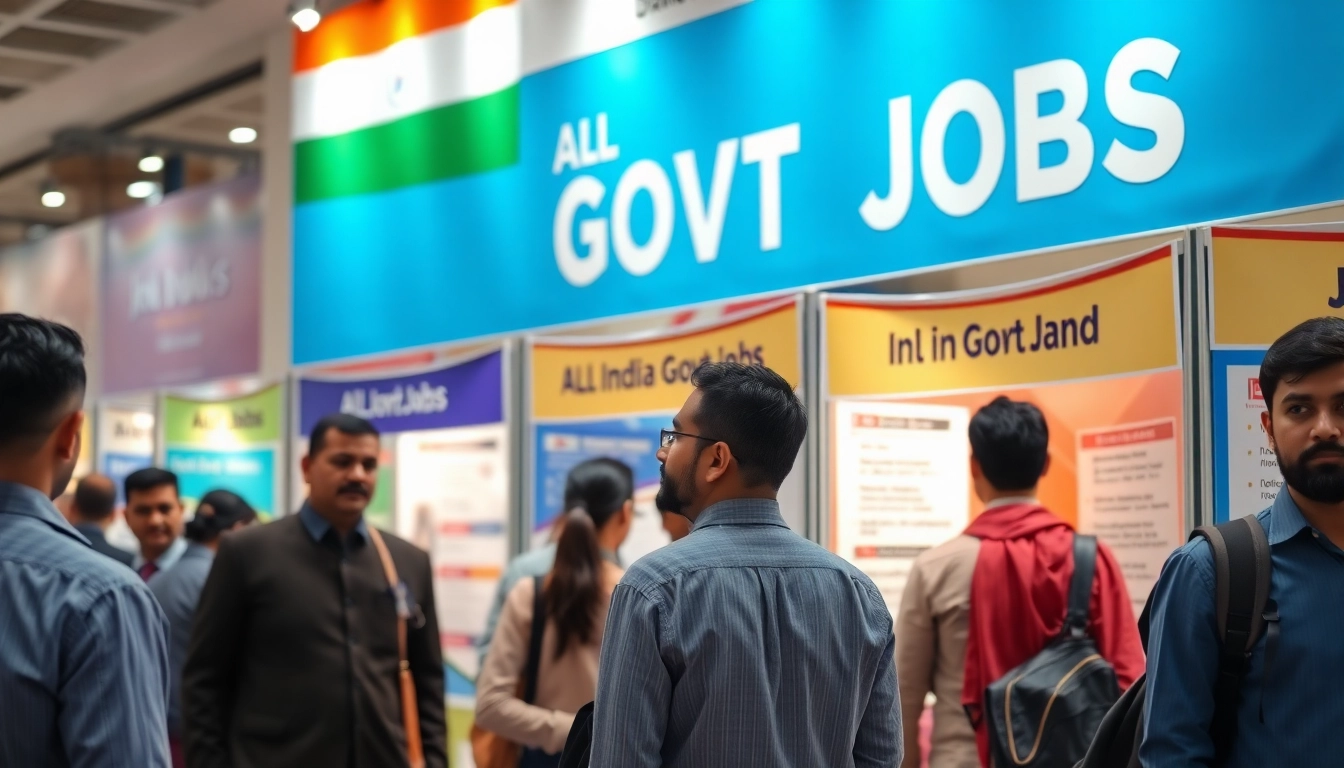Understanding the Vast Spectrum of All India Govt Jobs in 2025
As India continues to develop dynamically, the government sector remains a magnet for aspirants seeking stability, lucrative benefits, and a reputable career path. For those exploring options, All India Govt Jobs offer a comprehensive platform to stay informed about the latest openings, exam notifications, and essential application details. The landscape of government employment in 2025 is more diverse than ever, spanning across various sectors, each with its unique eligibility criteria, selection procedures, and growth prospects.
Major Sectors Offering Government Jobs
Central Government Departments
The primary source of prestigious government jobs in India stems from departments directly under the central government. These include ministries like Defence, External Affairs, Home Affairs, Finance, and others. They regularly conduct exams such as SSC CGL, SSC CHSL, and IB examinations, opening roles in administration, finance, intelligence, and technical fields. These positions are highly reputed, often offering allowances like HRA, DA, and travel concessions, along with pensions and other retirement benefits.
State Government Services
Each Indian state manages its own recruitment through State Public Service Commissions (SPSC). Roles in administration, police, revenue, forest services, and education are among the most sought-after. State-level exams like UPPSC, TSPSC, and TNPSC provide ample opportunities for candidates interested in state governance, with a focus on regional development and district management.
Banking Sector
Banking Jobs, especially in Public Sector Banks such as SBI, PNB, and ICICI, continue to attract lakhs of aspirants annually. These jobs include Probationary Officers (PO), Clerk positions, and Specialist Officers. The Bank exams conducted by IBPS, RBI, and SBI are known for their rigorous selection process, and the roles involve customer support, account management, and financial analysis.
Railway Recruitment
Indian Railways remains one of the largest employers in the country. Through RRB (Railway Recruitment Boards) and zone-specific notifications, candidates are recruited for posts such as Group D, NTPC, JE, and Group C vacancies. The zone-wise release of vacancies and extensive range of technical and non-technical roles make railway jobs highly competitive and desirable.
Teaching and Academic Institutions
Teaching roles in public schools, colleges, and universities attract a significant number of candidates each year. Exams such as CTET, TET, and State Teacher Eligibility Tests (STET) serve as gateways to a career in education. Designations include Primary Teachers, Secondary Teachers, Assistant Professors, and Lecturers, each with specific qualification criteria and pay scales.
High-Responsibility and Specialized Government Roles
Government jobs also span high-responsibility positions in ministries and departments such as the Indian Administrative Service (IAS), Indian Police Service (IPS), and Indian Foreign Service (IFS). These are generally filled through the UPSC Civil Services Exam, demanding thorough preparation and analytical skills, but offering unmatched career growth and social prestige.
Understanding Eligibility and Recruitment Procedures
Minimum Educational Qualifications
The eligibility criteria vary based on the position. Entry-level posts like clerk, LDC, and constable typically require a minimum qualification of Class 10 or 12, while higher roles like officers or engineers may require graduation or post-graduate degrees. Professional qualifications such as B.Tech, M.Tech, MCA, MBA, and Nursing are also common prerequisites for specialized roles.
Age Limits and Relaxations
Most government exams set age brackets between 18 and 32 years, with relaxations provided for reserved categories and candidates from specified regions. These relaxations aim to promote inclusivity and provide opportunities for marginalized groups.
Selection Process Overview
The selection involves multiple stages, generally including a preliminary exam, mains exam, and interview or skill test. Some positions also mandate physical fitness tests, medical examinations, and background verification. The process ensures only the most suitable candidates secure a permanent role.
Latest Trends and 2025 Opening Trends in Government Recruitment
The surge in digital transformation and e-governance initiatives has led to a boom in online applications and virtual examinations. In 2025, an increasing number of recruitment drives are conducted entirely online, streamlining the process for millions of applicants across India. Further, sectors like AI, cybersecurity, and data analysis are being integrated into mainstream government roles, creating new opportunities for skilled professionals.
How to Stay Updated and Apply for All India Govt Jobs
Official Sources and Reliable Websites
For real-time updates, candidates should primarily rely on official notifications from government portals like SSC, UPSC, and respective State Public Service Commission websites. Additionally, portals like eGovJob.com serve as consolidated platforms for the latest exam alerts, admit cards, and results, ensuring comprehensive coverage.
Step-by-step Application Process
The application process typically involves registering on the official portal, filling out personal and educational details, uploading scanned photographs and documents, paying the application fee online, and submitting the form before the deadline. Candidates should meticulously follow official instructions and keep track of application numbers for future reference.
Important Dates and Deadlines
Key dates such as notification release, application start and end dates, admit card availability, exam dates, and result announcements should be tracked via official sources. Setting reminders and subscribing to alert services can prevent missed deadlines and last-minute hassles.
Effective Preparation Strategies for Government Exams in 2025
Choosing the Right Study Material and Resources
Preparation begins with selecting authentic and comprehensive study materials including NCERT books, standard reference guides, and current affairs compilations. Online platforms such as Testbook, Unacademy, and official mock test portals offer quality content aligned with exam patterns. Focused preparation on topics relevant to the specific exam increases success chances significantly.
Time Management and Practice Techniques
Creating a disciplined timetable that allocates adequate hours to each section—Quantitative Aptitude, General Intelligence, Reasoning, English, and General Awareness—is crucial. Regular revision, time-bound mock tests, and solving previous years’ papers help familiarize candidates with exam formats and improve speed and accuracy.
Mock Tests and Previous Year Papers
Practicing mock tests under exam-like conditions is vital to identify strengths and weaknesses. Analyzing errors and revisiting difficult topics prepares aspirants for the real exam environment. A systematic approach to solving previous year papers enhances confidence and optimizes performance.
Cracking the Exam: Tips, Challenges, and Solutions
Understanding the Exam Pattern and Syllabus
Familiarity with specific exam syllabi and pattern variations—such as negative marking, sectional timing, and qualifying standards—enables focused preparation. Regular updates from official notifications should be monitored to adapt to any pattern changes.
Managing Stress and Anxiety during Exams
Maintaining mental health is crucial during the rigorous preparation phase. Techniques like meditation, deep breathing, and staying positive help manage stress. Adequate sleep, balanced diet, and regular breaks contribute to overall well-being and improved performance.
Maximizing Scores and Preparing for Interviews
Post written exams, the interview or personality test assesses candidates’ suitability. Preparing for this involves revisiting personal achievements, current affairs, and practicing articulate communication. Confidence and clarity often make the difference in final selection.
Benefits, Salary, and Long-term Career Growth
Key Advantages of Government Employment
Government jobs are highly valued for their job security, attractive retirement benefits, healthcare facilities, housing schemes, and various allowances. Less work-related stress, fixed office hours, and regular holidays make these roles desirable. Moreover, social status in rural and urban communities offers a sense of prestige and stability.
Salary Structure and Growth Trajectory
Post the 7th Pay Commission, salaries are revised periodically, with positions attracting allowances such as HRA, DA, TA, and medical reimbursements. Entry-level salaries depend on the cadre but generally range from INR 25,000 to INR 70,000 in initial stages, scaling up considerably with experience and promotions. Long-term prospects include higher administrative roles, departmental transfers, and deputations.
Long-term Career Progression Opportunities
Progression pathways include promotions to supervisory, managerial, and administrative posts, along with specialized training programs. The pension and gratuity schemes further secure financial stability post-retirement. Many government employees also leverage lateral movement into higher offices or inter-departmental transfers to diversify their career.

